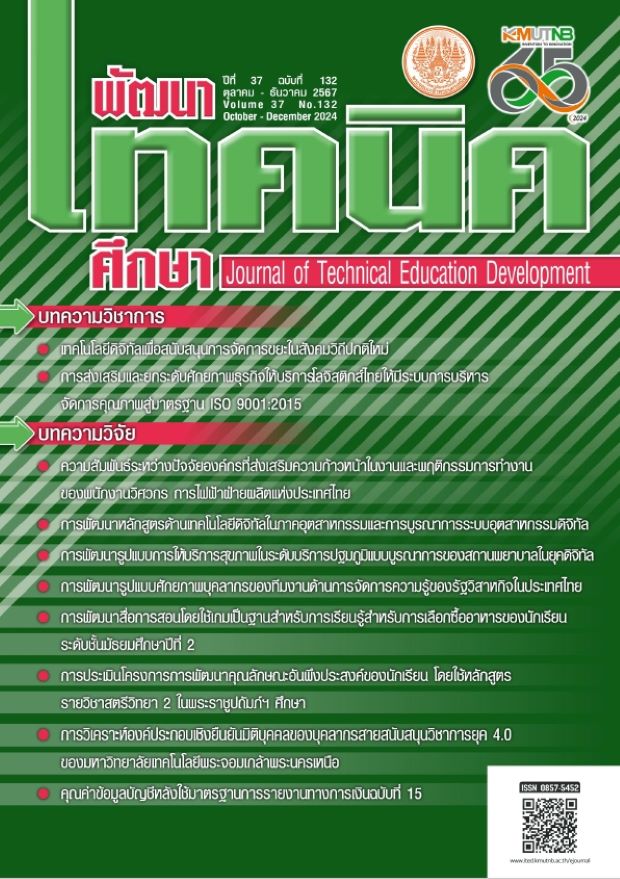เทคโนโลยีดิจิทัลเพื่อสนับสนุนการจัดการขยะในสังคมวิถีปกติใหม่
Main Article Content
บทคัดย่อ
บทความวิชาการนี้มีวัตถุประสงค์ เพื่อนำเสนอแนวคิดการใช้เทคโนโลยีดิจิทัลเพื่อสนับสนุนการจัดการขยะในสังคมวิถีปกติใหม่ ประกอบด้วย 1) วิทยาการหุ่นยนต์ 2) เทคโนโลยีปัญญาประดิษฐ์และโครงข่ายประสาท 3) เทคโนโลยีอินเทอร์เน็ตสรรพสิ่ง 4) การประมวลผลแบบกลุ่มเมฆ 5) การวิเคราะห์ข้อมูล และ 6) แอปพลิเคชันเพื่อธุรกิจธนาคารขยะ โดยการรวบรวมเอกสารและงานวิจัยที่เกี่ยวข้อง ศึกษาความเป็นไปได้ในการนำเอาเทคโนโลยีดิจิทัลที่ทันสมัยเพื่อเป็นแนวทางในการประยุกต์ใช้เทคโนโลยีดิจิทัลในการสนับสนุนการจัดการขยะ และเพิ่มประสิทธิภาพในจัดการขยะรีไซเคิลในสังคมวิถีปกติใหม่
Article Details

อนุญาตภายใต้เงื่อนไข Creative Commons Attribution-NonCommercial-NoDerivatives 4.0 International License.
เอกสารอ้างอิง
กรมควบคุมมลพิษ กระทรวงทรัพยากรธรรมชาติและสิ่งแวดล้อม. (2559). ปัญหาสิ่งแวดล้อมขยะ. [ออนไลน์].
[สืบค้นเมื่อ 21 สิงหาคม 2564] จาก http://www.pcd.go.th/
องค์การบริหารจัดการก๊าซเรือนกระจก (องค์การมหาชน). (2557). สถานการณ์ก๊าซเรือนกระจก. [ออนไลน์].
[สืบค้นเมื่อ 21 สิงหาคม 2564] จาก http://www.tgo.or.th/2020/index.php/th/post/สวีเดนขยะ
เกลี้ยง-ผลิตกระแสไฟฟ้าหมด-จนต้องนำเข้า800,000 ตัน-85
PPTV Online. (2564). คนเก็บขยะเสี่ยงสัมผัสเชื้อโควิด-19. [ออนไลน์]. [สืบค้นเมื่อ 8 พฤษภาคม 2564]
จาก https://www.pptvhd36.com/news/สุขภาพ/147051
Onoda, H. (2020). Smart approaches to waste management for post‐COVID‐19 smart cities
in Japan. IET Smart Citie. Vol. 2 No. 2, 89–94.
Hancu, O., Rad, C. R., Lapusan, C.1 and Brisan, C. (2018). Aspects concerning the optimal
development of robotic systems architecture for waste sorting tasks. In IEEE (Ed.), The 8th
International Conference on Advanced Concepts in Mechanical Engineering.
Kshirsagar, P. R., Kumar, N., Almulihi, A. H., Alassery, F., Khan, A. I., Islam, S., Rothe, J. P.,
Jagannadham, D. B. V. and Dekeba, K. (2022). Artificial Intelligence-Based Robotic Technique for Reusable Waste Materials. Computational Intelligence and Neuroscience. Vol. 2022, 1-9.
Papadakis, E., Raptopoulos, F., Koskinopoulou, M. and Maniadakis, M. (2020). On the Use of
Vacuum Technology for Applied Robotic Systems. In IEEE (Ed.) 6th International Conference on Mechatronics and Robotics Engineering. 73– 77.
More, E. K. D., Divya, S., Kalyani, G. and Gowthami, R. (2018). Automatic Waste
Segregator Bin Using Robotic ARM. 3rd IEEE International Conference on Recent Trends in Electronics, Information & Communication Technology (RTEICT-2018). 1555–1558.
Khan, R., Kumar, S., Kumar A.S., Dhingra, N., Gupta, M., Bhati, N. and Kumari, P. (2021). Machine
Learning and IoTBased Waste Management Model. Computational Intelligence and Neuroscience. Vol. 2021, 1-11.
Diya, S. Z., Proma, R. A., Islam, M. N., Anannya, T.T., Mamun, A. A., Arefeen, R., Mamun, S.
Al, Rahman, I. I. and Rabbi, F. (2018). Developing an Intelligent Waste Sorting System with Robotic Arm : A Step towards Green Environment. International Conference on Innovation in Engineering and Technology (ICIET), 27–29.
Kabele, K. and Urban, M. (2021). Modelling and Simulation of Autonomous Indoor Robotic
Wastebin in Webots for Waste Management in Smart Buildings Modelling and Simulation of
Autonomous Indoor Robotic Wastebin in Webots for Waste Management in Smart B uildings.
IOP Conference Series: Materials Science and Engineering. Vol. 1251, 1–12.
Amitha, S., Raj, P. N., Sonika, H. P., Urs, S., Tejashwini, B., Kulkarni, S. A. and Jha, V.
(2020). Segregated Waste Collector with Robotic Vacuum Cleaner using Internet of
Things. 2020 IEEE International Symposium on Sustainable Energy, Signal Processing
and Cyber Security (ISSSC), 1–4.
Samonte, M. J. C., Baloloy, S. H. and Datinguinoo, C. K. J. (2021). e-TapOn : Solar-Powered
Smart Bin with Path-based Robotic Garbage Collector. In IEEE (Ed.), 2021 IEEE 8th International
Conference on Industrial Engineering and Applications. 181– 185.
Chowdhury, B. and Chowdhury, M. U. (2007). RFID-based Real-time Smart Waste
Management System. 2007 Australasian Telecommunication Networks and Applications
Conference, 175–180.
European Environment Agency. (2021). Digital technologies will deliver more efficient
waste management in Europe. [Online]. [Retrieved May 8, 2021]. from https://www.eea. europa.eu/themes/waste/waste-management/digital-technologies-will-deliver-more
Anbumani, P., Kant, G.S.Lakshmi., Loganathan, N. and Jeevaraj, S. (2018). Android Enabled
Waste Management System. International Journal of Engineering Research in Computer Science and Engineering. 5 (3), 617-621.
Opendatasoft. (2020, 12 October). How data can make waste (and city) management smarter. [Online]. [Retrieved October 12, 2020]. from https://www.opendatasoft.com/ en/blog/how-data-can-make-waste-and-city-management-smarter/
สุณีรัตน์ ยั่งยืน, จินดาวัลย์ วิบูลย์อุทัย,ธิดารัตน์ สมดี และสวรรค์ ธิติสุทธิ์. (2556). การวิจัยแบบมี
ส่วนร่วมในการจัดการธนาคารขยะของชุมชน บ้านหัวหนอง ตําบลขามเรียง อําเภอกันทรวิชัย จังหวัดมหาสารคาม. วารสารวิจัยสาธารณสุขศาสตรมหาวิทยาลัยขอนแก่น. 6 (3), 158-167.
พัชราภรณ์ หงษ์สิบสอง, ภัทธีรา ธุระยศ และพสิษฐ์ กันละนนท์. (2564). การพัฒนาเว็บแอปพลิเคชัน
เพื่อการจัดการขอมูลธนาคารขยะ โดยการมีส่วนร่วมของชุมชนมหาโพธิ์ อําเภอเมือง จังหวัดน่าน.
วารสารวิชาการการจัดการเทคโนโลยี มหาวิทยาลัยราชภัฏมหาสารคาม. 8 (1), 73-86.
พิชิต วันดี, สกรณ์ บุษบง และเสกสิทธิ์ ดวงคํา. (2562). การพัฒนาแอปพลิเคชันเพื่อการบริหารจัดการ
ขยะแบบครบวงจรผ่านระบบคิวอาร์โค้ดขององค์การบริหารสวนตําบลบ้านยาง อําเภอเมือง จังหวัดบุรีรัมย์.
กรุงเทพมหานคร: มหาวิทยาลัยราชภัฎบุรีรัมย์.
Alqahtani, F., Al-Makhadmeh, Z., Tolba, A., & Said, W. (2020). Internet of things-based urban waste management system for smart cities using a Cuckoo Search Algorithm. Cluster
Computing, 23, 1769–1780.
ศูนย์วิจัยยุทธศาสตร์ไทย-จีน. (2562). แนวทางของจีนในการกำจัดขยะ โดยใช้เทคโนโลยี
และนวัตกรรม ควบคู่ กับการปลุกจิตสำนึกของประชาชน.[ออนไลน์].
[สืบค้นเมื่อ 21 สิงหาคม 2564] จาก http://www.vijaichina.com/articles/1276
วิทยาลัยนวัตกรรมสื่อสารสังคม. (2563). Application: COSCI Life. [ออนไลน์].
[สืบค้นเมื่อ 21 สิงหาคม 2564] จาก http://cosci.swu.ac.th/showcase/multi-cyber- commu/2020/cosci-life


